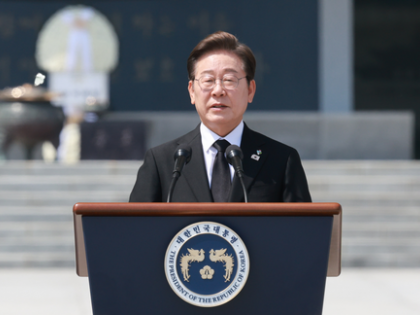South Korea: Lee nominates veteran lawmaker as first civilian defence chief in 64 years
By IANS | Updated: June 23, 2025 17:33 IST2025-06-23T17:29:18+5:302025-06-23T17:33:53+5:30
Seoul, June 23 South Korean President Lee Jae Myung on Monday named five-term lawmaker Ahn Gyu-back as Defence ...

South Korea: Lee nominates veteran lawmaker as first civilian defence chief in 64 years
Seoul, June 23 South Korean President Lee Jae Myung on Monday named five-term lawmaker Ahn Gyu-back as Defence Minister, the first time in 64 years that a civilian has been nominated for the post, the presidential office said.
Lee's pick of Ahn is seen as carrying out his election pledge to reform the military, a key promise from his presidential campaign to rebuild a nation fractured by the brief imposition of martial law in December last year under his predecessor, the ousted President Yoon Suk Yeol.
The military has come under scrutiny since Yoon deployed troops to the National Assembly when he declared martial law on December 3, allegedly to block lawmakers attempting to stop his brief imposition of martial law decree. Yoon was removed from office in April over the martial law debacle.
Ahn is a veteran politician with the Democratic Party who has mostly served on the defence subcommittee of the National Assembly. If confirmed, he will be the first civilian Defence Minister since 1961, when former President Park Chung-hee seized power through a military coup.
"As the first civilian Defence Minister in 64 years, Ahn is expected to lead and oversee the transformation of the military that was mobilised during the martial law period," presidential chief of staff Kang Hoon-sik said in a press briefing.
Lee also tapped former Vice Foreign Minister Cho Hyun as South Korea's top diplomat, as he announced his picks for 11 Cabinet positions, including ministers for the environment, science and labour, in the latest nominations since he assumed office June 4.
Lee chose Cho for his first Foreign Minister as he is considered the right candidate to deal with key pending diplomatic issues, including tariff negotiations with the United States and Middle East affairs, Kang said.
Cho, a retired veteran diplomat, served as both the first and second vice ministers under the Moon Jae-in government before serving as the South Korean Ambassador to the United Nations from 2019-22. He is known for his extensive experience in multilateral diplomacy and trade issues.
Lee also nominated Chung Dong-young, a journalist-turned-veteran DP lawmaker, for Unification Minister, responsible for inter-Korean affairs. Chung previously served as the Unification Minister under the Roh Moo-hyun government from 2004-05.
"Chung has unmatched experience and a firm commitment to peace on the Korean Peninsula. He's the right person to help create conditions for dialogue with North Korea and to find a breakthrough in easing tensions on the Korean Peninsula," Kang said.
Bae Kyung-hoon, head of LG AI Research, was named Minister for Science and ICT, with former conservative lawmaker Kwon Oh-eul being tapped as Minister for Veterans Affairs, Yonhap news agency reported.
Lee added incumbent DP lawmakers to his ministers' list. Rep. Kim Sung-whan was tapped as Minister for the Environment, Rep. Kang Sun-woo as Minister for Gender Equality, and Rep. Jun Jae-soo as Oceans Minister.
Han Seong-sook, former CEO of South Korea's internet portal giant Naver Corp., was named to lead the Ministry of SMEs and Startups.
Kim Young-hoon, former head of the Korean Confederation of Trade Unions, was tapped as Labour Minister.
Song Mi-ryeong, the current Agriculture Minister who was appointed by Yoon, will retain her post. Kang said it was a decision made in line with the Lee government's "pragmatic" policy approach.
Lee also named Yoon Chang-yul, former first deputy director of the Office for Government Policy Coordination, its director.
Kang said the nominees are expected to carry out their duties to help build an administration that produces results in line with Lee's emphasis on pragmatism and effectiveness.
"In particular, they are expected to deliver tangible results, such as in advancing diplomacy based on national interests, easing tensions on the Korean Peninsula, responding to climate change and developing Arctic shipping routes," Kang added.
The nominees will undergo parliamentary confirmation hearings, but the procedure is largely seen as a formality as their appointments do not require the endorsement of the National Assembly.
In South Korea, the Prime Minister is the only Cabinet post that requires parliamentary consent.
Disclaimer: This post has been auto-published from an agency feed without any modifications to the text and has not been reviewed by an editor
Open in app